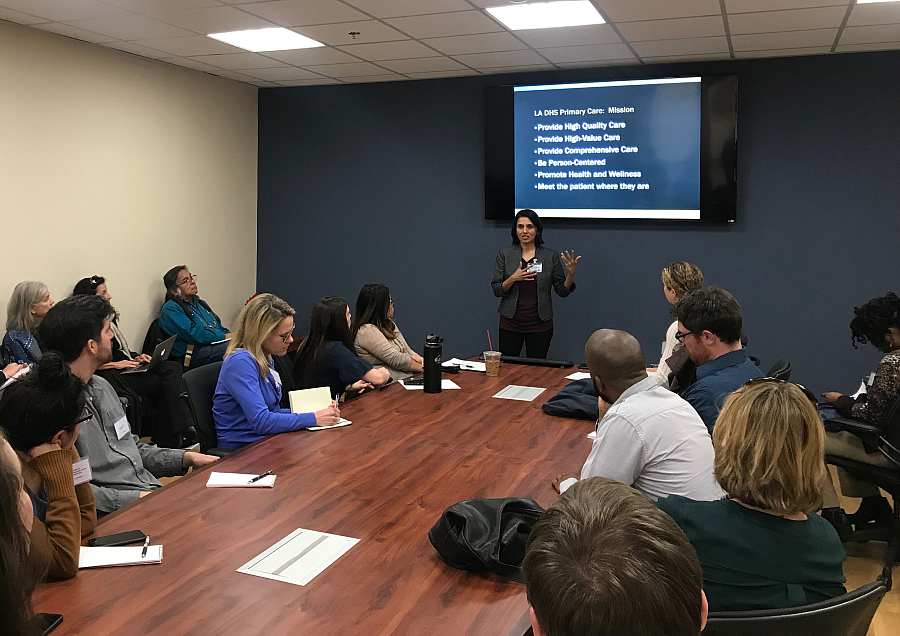Why L.A.'s largest county hospital is asking patients about way more than their symptoms

Dr. Jagruti Shukla, director of primary care at LAC+USC, talks to journalists about addressing patients' social needs at the 2018 California Fellowship this week.
Militza Lobos discovered firsthand the power of a few questions. A medical assistant at the L.A. County-USC Medical Center primary care clinic, Lobos was taking the vital signs of a new patient, a well-dressed 37-year-old man.
She asked if he had recently lost interest in activities he’d previously enjoyed, and he said yes. Then she asked if he had enough food, and he answered that he didn’t always eat as healthy as he’d like.
When she asked about his housing, the man demurred, so Lobos started digging a little deeper. She asked how his sleep was, and then his story came out: the well-dressed man had been sleeping in his car for the past six months.
Lobos sprung into action. While the patient was waiting to see the doctor, she was able to get him two bagged meals from the hospital. And she helped him start an application for housing.
As she handed him the food and a list of shelters, Lobos saw tears well up in the man’s eyes.
“He told me, I really feel thankful I came here because people here give me that warm welcome,” she remembers.
In the traditional model of care, medical assistants might just take your blood pressure. Now, in a growing county effort, they’re working to address all kinds of social and behavioral needs. The LAC+USC medical center now calls on teams of providers — from pharmacists and psychiatrists to nutritionists and substance abuse counselors — to help patients on the spot.
The idea behind asking questions in routine screenings is to find out about problems like hunger, homelessness, fears of deportation, depression, or exposure to violence at home. “The idea is to treat the person, not the disease — and that includes the whole person,” said Dr. Jagruti Shukla, director of primary care at LAC+USC Medical Center, whiles speaking to fellows at the 2018 California Fellowship this week.
Shukla recalled a patient’s story from earlier in her career that has stayed with her. The patient was struggling to manage his diabetes. After many visits in which his blood sugar was high, Shukla took some extra time to sit and hear his story. The patient recounted the moment in which he discovered bombs fall on two of his friends during the Civil War in Lebanon, where his family had also been killed. He eventually emigrated to the U.S. “Aside from being traumatic, it made me realize this was a person with a worldview that everything can be taken from you at any moment,” said Shukla. “Why take your medicine to prevent a heart attack if you’re not going to be around in 20 years?”
With that new insight into her patient’s past, Shukla shifted her approach, talking with the patient about how controlling his blood sugar could help him today — not only by preventing blindness and infections, but by giving him the energy to play chess with his friends and feel better overall. The new approach, guided by a deeper sense of her patient’s story, worked.
Dr. Barbara Rubino, acting medical director of the adult primary care clinics at LAC+USC, helped usher in the new changes. She said the clinics first rolled out screening questions about mental health, and then questions around social needs. The newest screening question tries to identify food insecurity, and the clinic can now sign patients up for CalFresh (food stamps) right in the clinic.
Asking questions about patients’ lives at home has also brought some benefits in the clinic. Since the doctors, nurses and medical assistants started asking routine screening questions about everything from housing to mental health, Rubino says they have gathered data showing improvements in blood sugar control and blood pressure control. The medical center plans to roll out the same screening protocol in geriatric and pediatric primary care later this year.
This new push to bring together a team of providers to care for peoples’ broader needs has led to some big life changes for patients such as Juan Muro, 46. Muro was a so-called “frequent flier” in the emergency room, showing up countless times at the medical center. He had a problem with alcohol and was living in a tent. After finally agreeing to enter alcohol abuse treatment, Muro was linked up with a community health worker, medication and housing assistance. He has now been sober for a year — and is living in an apartment. Rubino, Muro’s primary care physician, now sees him on a regular basis. “When you’re living out there, you get sick,” he says. “Now I do a lot of walking, and I eat better. I’m not depressed no more.”
Juan Muro, right, struggled with alcoholism and homelessness before a trip to the county hospital put him in touch with substance abuse counselor Taylor Haynes, left, who helped him enter recovery. (Photo: Chinyere Amobi/CHJ)
Shukla points out that there are a lot of stories like Juan’s among the 54,000 patients in the 10 LA County primary care clinics she oversees. “We are the touchpoint for access to services, so we have to start asking the questions,” she said. “We ask every patient, every time. And we will swoop on you when we detect there is an issue.”
Muro is grateful for the treatment he has received. “These doctors are wonderful,” he said. “If it weren’t for this program, I wouldn’t be here.”

